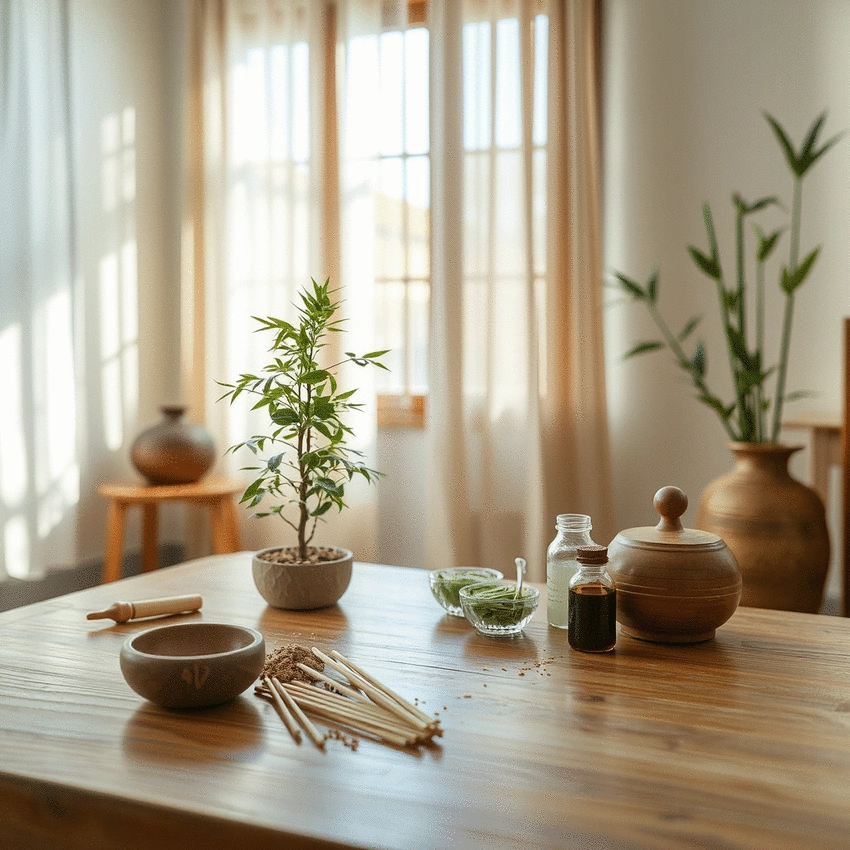Balancing Qi Through Seasonal Practices
By Kiran Wu / Feb 28
Have you ever considered how an unseen force influences your overall well-being? In Traditional Chinese Medicine, this force is called qi, the vital energy that flows through every aspect of our health. Understanding qi is not just about health; it's about harmonizing your entire life.
Explore the different types of qi and their significance in maintaining health and balance.
A harmonious balance of yin (cool, restful) and yang (warm, active) is vital for health.
In Traditional Chinese Medicine (TCM), the concept of qi (pronounced "chee") is central to understanding health and wellness. Qi is often described as the vital energy or life force that flows through the body, sustaining our physical, emotional, and spiritual well-being. Understanding qi is essential for anyone looking to enhance their health, as it helps us recognize how energy affects our daily lives. Imagine qi as the gentle breeze that nourishes a garden; without it, the flowers would wither away, just as our body can struggle without a balanced flow of energy.
At The Meridian Connection, we emphasize the profound importance of qi in our holistic approach to health. When we learn to cultivate and harmonize our qi, we open the door to a life filled with vitality and balance. This fundamental principle serves as a guiding light for our practices, reflecting our commitment to empowering individuals through the wisdom of TCM. For more information on how vital energy moves, consider reading about energy flow in Traditional Chinese Medicine.
So, what exactly is qi? In simple terms, qi is the energy that powers our bodies, flowing through specific pathways known as meridians. This energy plays a crucial role in every aspect of our health, from digestion and immune response to emotional stability. When our qi flows freely, we feel energized and healthy. However, when it is blocked or imbalanced, we may experience physical ailments, emotional challenges, or even spiritual disconnection.
Understanding the significance of qi is just the beginning. We also need to consider how it moves through our bodies. Think of your body as a network of roads and highways, with qi traveling along these routes to nourish and support every organ and function. By learning how to keep these channels clear, we can enhance our overall well-being.
Qi can be thought of as the foundation of life. In TCM, it is believed that the balance of qi is essential for maintaining good health. Healthy qi can help prevent illness, support recovery, and promote longevity. Here are a few reasons why understanding qi is vital:
Now that we know what qi is, let’s explore how it flows through the meridians. Think of meridians as invisible highways that connect different parts of the body. Each meridian corresponds to specific organs and functions, allowing qi to circulate efficiently. When these pathways are open and clear, the body operates smoothly, like a well-functioning machine.
If you consider your body as a garden once again, keeping the meridians clear is like ensuring the water flows freely through the irrigation system. When blockages occur, it hinders the flow of qi, leading to a variety of health issues. This is where the practice of acupuncture and other TCM therapies becomes essential, as they help restore balance and facilitate the smooth flow of energy. To understand more about the role of acupuncture, read about understanding acupuncture and meridians.
Qi is not a one-size-fits-all concept; there are different types of qi, each with distinct characteristics and functions. Understanding these types can provide valuable insights into your health and well-being. Let's delve into some of the primary forms of qi:
Prenatal qi is the energy we inherit from our parents at the moment of conception. It serves as the foundation of our vitality and influences our health throughout our lives. Conversely, postnatal qi is generated through our interactions with the world around us, particularly through food, air, and our lifestyle choices. By nurturing both forms of qi, we can create a more balanced and harmonious existence.
Defensive qi, often referred to as "wei qi," acts as the body's shield against external pathogens and environmental stressors. It helps maintain our health by defending against illness. On the other hand, nutritive qi nourishes our organs and tissues, ensuring that our body has the energy it needs to function optimally. Both types of qi play crucial roles in our overall health, highlighting the importance of a balanced lifestyle.
In TCM, yin and yang represent the dual nature of our energy. Yin qi is associated with coolness, nourishment, and rest, while yang qi embodies warmth, activity, and energy. A harmonious balance between these two forces is essential for maintaining physical and emotional well-being. When one outweighs the other, it can lead to disturbances in our health. Recognizing and nurturing this balance is key to achieving a state of harmony.
Lastly, it’s important to consider jing and shen, which are closely related to qi. Jing represents our essence and vitality, while shen relates to our spirit and consciousness. Together with qi, these elements create a triad that forms the foundation of our existence. By fostering a healthy relationship between jing, shen, and qi, we can cultivate a deeper sense of wellness and balance in our lives.
To enhance the flow of qi in your body, consider starting your day with a few minutes of gentle stretching or yoga. This not only awakens your muscles but also helps to clear any blockages in your meridians, setting a positive tone for the rest of your day.
Here are some common questions about Qi and its role in health and wellness:
As we navigate our daily lives, maintaining a harmonious flow of qi becomes essential. At The Meridian Connection, I often emphasize that our lifestyle choices play a significant role in how our qi is nurtured and expressed. By adopting certain practical strategies, we can restore and maintain our vital energy, cultivating a sense of well-being and vitality.
Let's dive into some daily practices that can assist in achieving balance. These practices not only support physical health but also foster emotional stability and mental clarity. Whether you’re new to the concepts of Traditional Chinese Medicine or have been on this journey for some time, incorporating these strategies can help you tune into your body’s natural rhythms.
To keep our qi flowing smoothly, it's important to establish a routine that nurtures our energy. Here are some effective daily practices to consider:
By harmonizing these aspects of your daily routine, you can promote a more vibrant flow of energy throughout your body. Each of these practices contributes to a holistic approach to well-being that aligns perfectly with the principles of TCM.
Your diet is a cornerstone of qi balance! Eating a variety of foods can profoundly impact your energy levels. I recommend focusing on:
By choosing foods that nourish your body and harmonize with the seasons, you can create a solid foundation for your qi.
Movement is essential for keeping qi flowing freely. Tai Chi and Qigong are two incredible practices that blend movement, meditation, and breath. They help to:
Whether you practice at home or in a class, these gentle movements invite a deeper connection to your body and its energetic pathways. Learn more about balancing qi for better health through various practices.
As the seasons change, our qi requires different forms of support. Adjusting your lifestyle accordingly can enhance your vitality. Here are some suggestions:
By aligning your lifestyle with seasonal changes, you can better support your qi and overall well-being throughout the year.
Alongside daily practices, traditional treatments can effectively address qi imbalance. Here are some methods I often recommend:
Integrating these treatments into your wellness routine can further enhance your energy and vitality. For insights into how acupuncture can affect treatment outcomes, explore meridians and acupuncture treatment outcomes.
In conclusion, maintaining and restoring qi balance requires a multifaceted approach, combining daily practices, dietary choices, and traditional treatments. By being proactive about our energy management, we can lead healthier, more vibrant lives. I hope you find these strategies helpful as you continue your journey toward holistic wellness with The Meridian Connection!
Here is a quick recap of the important points discussed in the article:

 Balancing Qi Through Seasonal Practices
As the seasons change, so do our bodies and minds. The ancient wisdom of Traditional Chinese Medicin
Balancing Qi Through Seasonal Practices
As the seasons change, so do our bodies and minds. The ancient wisdom of Traditional Chinese Medicin
 Meridians and Chronic Pain Explained
Have you ever considered how ancient wisdom can illuminate modern health challenges? The fascinating
Meridians and Chronic Pain Explained
Have you ever considered how ancient wisdom can illuminate modern health challenges? The fascinating
 Meridian Blockages and Health Effects
Have you ever considered how the flow of energy within your body can impact your overall well-being?
Meridian Blockages and Health Effects
Have you ever considered how the flow of energy within your body can impact your overall well-being?